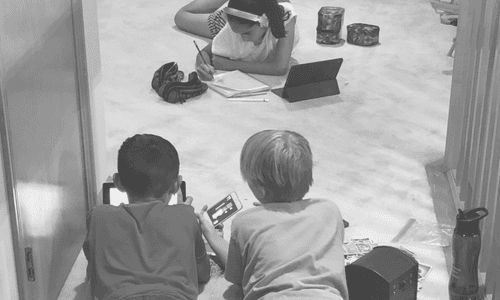Listening: The Secret To Great Relationships & How To Be Better At It

Working moms carry a heavy mental load and it can negatively impact communication between spouses or parents and kids. Research shows that listening can improve our lives and our relationships because it is such a powerful skill. You’ve heard about active listening, but do you know your listening style? You’ll learn about your strengths and weaknesses and get some personalized tips to improve your listening skills (and more importantly, your relationships) based on your style.
My biggest weakness when it comes to communication is listening, especially to my family. Like most working moms, the mental load I carry makes it hard to really focus on what’s happening in the moment. I often struggle to be fully present.
This is pretty common for working moms because we tend to carry the mental load in our families–even when husbands and kids help out. For example, here’s what’s on my mind as I write this…sound familiar?
Do I have everything we need for dinner? Is there enough time for the boys to eat and shower and get to bed? How did I forget about a breakfast for Sam at school tomorrow? Did Gabe get his project finished? I need to call the orthodontist and the pediatrician. Oh, and I can’t forget the dentist tomorrow…
…The house is a wreck, but I don’t have the energy to clean it up. Did I send in the right paperwork for Dad’s Medicaid renewal? I should email someone to make sure. I need to make a grocery list and pack for the weekend. Did the laundry get moved to the dryer? Do the boys have clean uniforms for the soccer tournament? How are we going to coordinate their schedules so everyone is in the right place?…
…The dog will not stop barking! I’ll have to read about some solutions. I need to check in on Gabe’s phone and take a look at the security report for his school laptop. I missed the care conference for Dad, so I should follow up with the nursing home tomorrow. Vacation is only 6 weeks away, and I need to check out some tour options and talk to the boys about what they’d like to do…
…We’re going to have to talk to the boys about the music they’re listening to because the station I just found is definitely not okay. I forgot to pick up my prescription. Again. What is Ken’s travel schedule next week? I don’t think I need help with school drop off and pick up, but I better make sure. Do I need gas in the car? And on and on and on.
All that, and none of it is about my teaching job or SALT effect or anything outside of my family. I know the same is true for you!

Taking a walk with my family always helps me relax.
The Mental Load of Working Moms
The Modern Family Index, a 2017 study commissioned by Bright Horizons Family Solutions, showed that the mental load of working mothers is very real, and it affects a lot of families! The U.S. Department of Labor reports that over 70 percent of moms with kids under 18 are employed:
- 86% say they handle all family and household responsibilities
- 72% percent feel it’s their job to stay on top of kids’ schedules
It’s no wonder we’re exhausted! And even if we do have spouses who help (my husband and I split a lot of responsibilities related to our kids), research shows it’s still unbalanced when it comes to the mental energy we expend.
Now, this reality isn’t likely to change anytime soon, but there are a few things we can do to make it a little easier. This post is dedicated to a communication skill that can make a huge difference, but we’ve offered tips, tricks, hacks and advice in other blogs–and we know they work because we’ve used them. A few you should check out if you’re feeling overwhelmed or like you’re stuck in survival mode:
- The Secret to the Most Successful ‘Type A’ Moms
- Top 10 Things You’ve Never Searched on Pinterest (But Should)
- How to Manage Chores, a Proven Predictor of Success
Dangers of Not Listening Well
I’m sure you’ve heard about active or empathic (not empathetic) listening and most of you probably think you’re a pretty good listener. Unfortunately, the research suggests the opposite is true. If you had a quick moment of denial or rolled your eyes at the mention of “active listening,” you’re not alone…but poor listeners cost themselves and others a lot of time, energy and money.
Here’s an unbelievable stat: poor communication has cost companies over $37 billion. Billion! That’s crazy!
(Who said soft skills don’t matter?)
If that’s the financial repercussion for companies, imagine the cost of poor listening on families! We can’t measure it in dollars, but it certainly impacts relationships between spouses as well as between parents and kids.
Last year, a second-grade teacher’s Facebook post went viral, and not because it was heart-warming:

I don’t know about you, but this comment on the post from another teacher definitely had me feeling guilty: “We had a class discussion about Facebook and every single one of the students said their parents spend more time on phones than they do talking to their child.”
When we’re not listening to our kids because we’re distracted by our own technology use (it’s time to look in the mirror), kids become more restless and prone to outbursts of anger. Not listening to our kids can contribute to behavior problems!
In the last few years, I’ve forgotten or lost track of so.many.things. More than ever before. I don’t like to admit it because I’m usually on top of things. But I honestly believe the increasing mental load makes it worse. This sandwich generation stuff is no joke: a Stress in America survey from the American Psychological Association reported that women ages 35-54 feel more stress than any other age group because they’re juggling the “demanding, delicate acts of caring for growing children and their aging parents.”
Everything demands my attention (well, okay, it feels like everything) and I don’t always know (or care) what I should be listening to. I know I also spend more time than I should on my phone or a device–and now as an online entrepreneur, it’s even harder to find a healthy balance.
What I’m doing right now isn’t working, and I need to make some changes. We’ve said it in posts before: the only person I can change is me, the only thing I can change is my response.

How to Listen Better: Know Your Listening Style!
Here’s the good news!
- Science tells us that we can train ourselves to be better listeners.
- Being a better listener isn’t hard, but it does require us to slow down, make an effort and actually want to improve.
- Understanding our own listening styles or preferences can give us tremendous insight about how we can be better listeners.
There are 4 main listening styles or preferences, and like most things in life, each one has strengths and weaknesses. You probably see yourself in more than one, but which one fits you best?
1. People-Oriented Listeners
Strengths: If you love people and relationships, then this is probably your preference. You tend to be empathetic, aware of subtleties in conversation and in tune with nonverbal behavior. You hear the meaning behind the message, so people often seek you out when they want someone to listen to them.
Weaknesses: You can get distracted and worry too much about other people’s problems and you may avoid conflict, even when it could be beneficial. When you’re in a group, you often have too many side conversations.
I lean toward this preference and it gets me into trouble when I’m at larger gatherings. I want to talk to a lot of different people, so I know sometimes I seem distracted. I’m also guilty of side conversations, although the rule-follower in me helps curb that a bit.
How to Be a Better Listener:
- Pay attention to potential conflict and be willing to address it, even if it’s uncomfortable. Relationships grow (something you like!) when people are able to talk through problems and address them in a healthy way.
- Silence your phone or set it aside so you’re really focused on the person in front of you. If you’re with a group of people, be aware of when you’re tempted to start a side conversation or jump into a different conversation–don’t lose focus on the original discussion. (This helps with the mental load because you’re less likely to miss something important.)
2. Action-Oriented Listeners
Strengths: If people would describe you as someone who gets things done, then this is likely your style. You tend to be task-oriented and focused on taking action or solving problems. You help everyone stay on task because you remember the details.
Weaknesses: You can be critical when things aren’t organized or when the conversation is too far off task. If you feel like you’re not making noticeable progress, you can lose interest and disengage.
I think I need to always have friends who are action-oriented listeners because they remember some of the details that I completely miss. But I’m also a fan of problem-solving and crossing off items on a to-do list, so I may have a little of this preference.
How to Be a Better Listener:
- Remember that not everyone is as organized as you are, but they may still have great ideas or insight. Be willing to give the discussion a little time and don’t push for a quick solution.
- Instead of criticizing or disengaging, ask questions to subtly bring the conversation back to the point. (This is helpful when your kids are telling a long story and you’re tempted to move on to the next thing so you can check it off your list.)
3. Content-Oriented Listeners
Strengths: If you are analytical and pay attention to detail, then this is probably your preference. You tend to carefully think things through and notice what’s not being said. You see through weak arguments because you’re drawn to research-based information from experts.
Weaknesses: You can be intimidating to others who aren’t as informed or analytical, especially when you’re critical in a discussion. Sometimes you spend too much time dissecting information which makes it difficult to move forward.
This isn’t my preference, but you’re probably not surprised to hear that I love learning from people who know what they’re talking about. But I also get bored pretty quickly when people argue or discuss something that I think doesn’t have much practical relevance–I need to be more patient with that.
How to Be a Better Listener:
- Remember that people’s individual experiences and stories may be just as important as research. When someone offers a perspective that differs from yours, be willing to listen and find value in what they have to say.
- Realize that you’re not always going to be right. Be intentional about hearing people out and avoid jumping to conclusions, even when it’s really hard. You’ll be surprised at how much communication improves when people feel heard. (This one is particularly helpful to remember as a parent because we have a tendency to devalue the perspective of our kids because they don’t have the years of experience that we do.)
4. Time-Oriented Listeners
Strengths: If you are efficient and enjoy streamlined processes, then this is likely your style. You value other people’s time and you notice impatient nonverbal behaviors. You keep everyone on schedule.
Weaknesses: You tend to miss out on interesting and creative discussions that lead to unique ways of solving problems. When time is short and you feel the need to move on, others may not feel valued because you cut things off abruptly.
Ask my sister-in-law about this one and she’ll say this is definitely a preference that my brother and I share. We both get impatient when we’ve been sitting at a restaurant table for a long time because we don’t want to make anyone wait. In grad school, I had a professor who didn’t worry about meeting length at all. It made me a little anxious and I’ll never forget the first time she said to me, “I notice your leave-taking behaviors and I’m choosing to ignore them.” Huh. People don’t usually use the term “leave-taking behaviors” (packing up, facing the door, putting a bag or purse on your shoulder) in normal conversation, and they also don’t completely disregard meeting times, but I will say that I appreciated the honesty.
How to Be a Better Listener:
- Build in some extra time whenever you can–whether at a meeting, a lunch with friends or a conversation with your kids. Take a deep breath and relax for a few more minutes so you can finish up without rushing.
- Pay attention to the reaction of others when you’re ready to move on. If people are taken off guard or seem disappointed, take a minute to wrap up the conversation more intentionally. (This can help alleviate some of the mental load because you’ll focus more on people or things that really matter instead of being a slave to your schedule.)
Do you have any other suggestions about improving listening skills based on your style or preference? Or if you try some of these, let us know if it made a difference!






